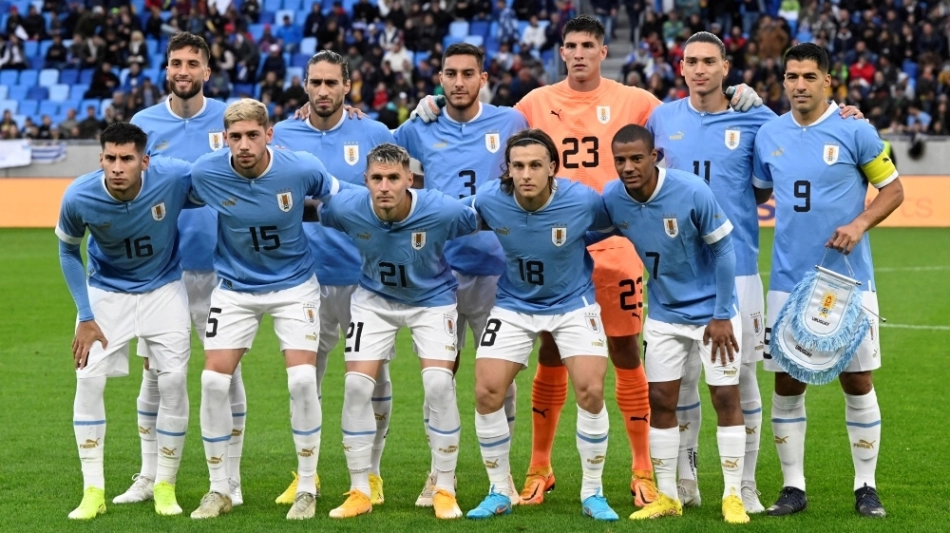Doha: After a difficult qualification for the FIFA World Cup Qatar 2022, Uruguay coach Diego Alonso believes that his team will have two strengths, which are the experience of playing in international tournaments, and the presence of a prominent and homogeneous group of players with each other for a while.
Uruguay, by participating in the World Cup finals for the fourteenth time in Qatar, hopes to restore its football glories, and win the title for the third time in its history after 1930 (Uruguay) and 1950 (Brazil).
Alonso may face a major crisis in the average players of the team, which exceeds thirty, especially with the arrival of Luis Suarez, the historical top scorer for Uruguay, and his dangerous colleague, Edinson Cavani, 35 years each.
The current generation of Uruguayan players has a strong element of communication and consistency at the level, especially after Alonso took over the task of coaching the national team in late December, succeeding Oscar Tabarez, led them to qualify for the World Cup in Qatar.
Uruguay plays in the same traditional way 4-4-2, as it reached the semi-finals of the World Cup in South Africa and is like the traditional style of Italian teams, but this method met with failure in the World Cups in Brazil and Russia
Alonso relies on several distinguished names led by Luis Suarez and Edinson Cavani, in addition to goalkeeper Fernando Muslera, center-back Martin Caceres, defender and captain Diego Godin, in addition to other young elements after represented strong presence with the national team in the world cup qualifiers specially after peat Panama 5-0.
Uruguay is competing in the FIFA World Cup Qatar 2022, in a balanced group (H), which includes Portugal, Ghana and South Korea.
Uruguay team will kicks-off its World Cup campaign against South Korea on November 24, and then faces Portugal in the second round on the 28th, to conclude its matches in the first round against Ghana on Dec. 2.
Uruguay team qualified for the World Cup in Qatar, after occupying third place in the South American qualifiers behind Brazil and Argentina, despite the decline in its ranking at the beginning of the qualifiers, and its suffering from possibilities of being away from the World Cup.
Uruguay will participate for the 14th time in the World Cup Finals after 1930, 1950, 1954, 1962, 1966, 1970, 1974, 1986, 1990, 2002, 2010, 2014 and 2018.
Uruguay, whose football association was established in 1900, has a distinguished history in the World Cup finals, being the first champion of the strongest and most prestigious competition in football, where crowned the title of the first edition of the World Championship in 1930, which was held on its soil, and also won second title in 1950 in Brazil.
The greatest achievement of Uruguayan football during the past 72 years in the world championships was to occupy the fourth place on three occasions, namely, the years 1954, 1970 and 2010, The greatest achievement of Uruguayan football during the past 72 years in the world championships was to occupy the fourth place on three occasions, namely, the years 1954, 1970 and 2010.
Uruguay has played 56 matches in the World Cup finals during its previous thirteen participations, during which it managed to achieve 23 victories, 12 draws and 20 losses, while it scored 87 goals and received 74 goals.
At the continental level, Uruguay is the team that has won the Copa America the most, equally with Argentina, with 15 titles. in the years: 1916, 1917, 1920, 1923, 1924, 1926, 1935, 1942, 1956, 1959, 1967, 1983, 1987, 1995, and 2011.
Uruguay also won twice the gold medal in the football competition in the 1924 Olympics and the 1928 Olympics
The Uruguayan national team has included many prominent stars throughout its history, most notably Luis Suarez, Juan Alberto Schiaffino, Diego Forlan, Enzo Francescoli, Rodriguez Andrade, Jose Santamaria and Ladislao Mazurkiewicz.
The current squad includes a distinguished group of players, led by Luis Suarez and Edinson Cavani, in addition to goalkeeper Fernando Muslera, Martin Caceres, defender and captain Diego Godin.
Source: QNA


